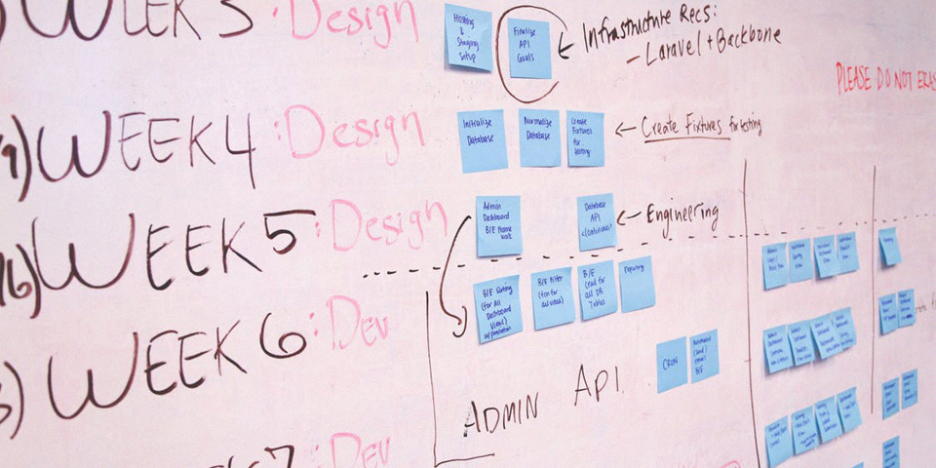When we went into the first lockdown in March of 2020 we thought it would be something temporary. Just like most of the people around us, we thought that the pandemic would be over if we all behaved well and helped curb the spread.
It didn’t.

Back then we already offered remote working to all the team, but we acknowledged that there were certain roles that were more suited to the office environment, mainly for logistical reasons.
Despite having remote-working options, we usually still popped into the office if we had a meeting, so most of our remote working was done locally.
Over the following period we realised that the freedom afforded to us by remote working was something that we wanted to hold onto, so we decided to re-organise the team to be remote-first.
Moving to remote-first was not a decision we took lightly. Some of our clients complained about it. They felt that it made it harder for us to do creative work. They felt that our employees might somehow work less.
I’m pretty sure that the decision cost us a client or two, but it’s hard to really tell how a relationship breaks down, so that could have just been one factor in many.
But to be honest, we were not that fussed. It’s never nice to lose clients, but we have a set of principles that define us, and a value match with our clients is critical to us. To be honest we’d far prefer to work with people who really share our vision than try to shoehorn in a relationship just to hold onto some business.
I’m not saying that we’ll only work with clients who are remote-first themselves, but we can only work with clients who trust us because of the results we deliver, not because we match their expectation of where we should be located.
Incidentally, I’m pretty sure that our drive to move to a 4-day workweek will also alienate some current and potential clients, but we can’t waiver. You need conviction to succeed in anything you do, and these distinguishing factors make us more like Marmite by the day – we’re not there to be loved by everybody, but the people who do will usually turn into our biggest advocates.

Remote working has worked for us in several ways:
- It gave incredible freedom to our employees. Some moved to other countries and they’re still working at full capacity.
- We got a larger employment pool, and actually employed someone who we’ve never met in real life. But she’s as much a part of the Switch Family as every other employee.
- It’s helped us work towards a more happy and fulfilled team, not only is the team working towards a four-day workweek, the team also saves around an hour (or two in some cases) of travel time. A day. Some of our colleagues are getting a work-day’s worth of time back. Every week.
- Productivity has increased dramatically. We’ve actually had to grow our project coordination team to cope with the extra workloads to distribute. We’d only ever do this if we grew the team significantly in the past.
- Employee turnover is at a record low for 2021. A year defined by The Great Resignation.
Remote working also takes more time and effort from a leadership perspective, especially because we were always a team that took extreme pride in the happiness of our team.
It wasn’t always easy. And I’m pretty sure that we failed some of our people in the process. We were learning on the job, and we made mistakes.
We adjusted as quickly as possible, and added a number of processes to ensure that the mental health of our people was taken care of. We have weekly slots for the whole team to just chat about whatever we’re working on. We have three slots a week when people can meet for a virtual coffee. We have monthly team-building exercises. A lot of time and effort goes into keeping the team happy, but it’s worth it.

What’s next?
Well, some of us are now working from the office once a week. We actually had to account for the loss of productivity for office days, but they’re great for the people who prefer to leave the house from time to time.
Since we’re working remotely, it also made it much easier for us to work with clients remotely, too, so we’ve actually benefited from a business perspective and grown our client base beyond these shores. Working with a team that’s remote makes the distance feel shorter. It changes the perception of distance, and psychologically it feels like I’m working with a client over a call because we work remotely, not because we’re halfway around the world.

And in exactly the same manner it made it easy for us to work with suppliers from around the globe, we’re currently undergoing a process-optimisation exercise with a project management consultancy that’s halfway around the world, too.
The bottom line is that remote working worked for us because it really matches our values. It has been excellent for the team and it’s brought about changes that we wouldn’t have arrived at otherwise.
But it requires trust in your team, and quite honestly, if you feel that your team needs to be in your line of sight to do their work, there are more fundamental issues you might need to address with urgency.

Say goodbye to your 60-hour work week
7 tips to stop business leaders from overworking.
Reach new heights: 6 key strategies to accelerate business growth
Growth is an ongoing process that business leaders have to work hard towards and be patient with.
Embracing change – My journey beyond the comfort zone
The comfort of routine can dull the spark of innovation and can dampen the spirit of growth, leaving both oneself ...
Adieu email stress – Five tips for business leaders to breeze through their inbox
Going through emails is not only a tedious task but it also leads to a drop in productivity.











